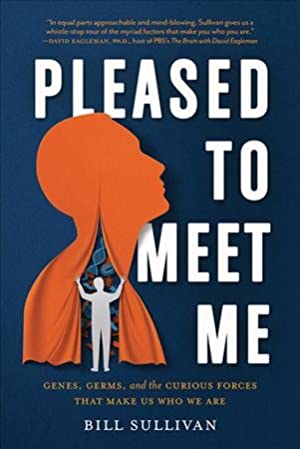Science and writing: What kind of work is out there?
The field of science-related writing is broad. There are many types of writers working toward a range of goals and for various audiences. This is a great thing, because it means there are many niches that need filling and that call for a wide variety and multiple combinations of skills! Here’s a breakdown of different sorts of science-related writing and editing paths.
Popular science writing

The type of writing that often comes to mind first when someone says “science writing” is popular science writing. Ed Yong’s coronavirus coverage in the Atlantic these past two years is a great example of this kind of science writing. Or Siddhartha Mukherjee’s book "The Emperor of All Maladies: A Biography of Cancer." This type of science writing anyone can read and learn from, regardless of whether or not they are scientists themselves or experts in the topic.
Places you might find this type of science writing include books, documentaries, YouTube channels, magazines (online and on paper), newspapers (also online and on paper), TV news programs, podcasts, radio, science and natural history museums, websites and newsletters for science organizations and universities, and websites dedicated to science news.
The crux of this type of writing and broadcasting involves taking complex scientific ideas and sharing them in a way that is understandable to anyone, as well as showing the relevance of the topic and how it connects to the rest of the world. The writing should be accurate, accessible, interesting and meaningful.
This type of science writing is often freelance, meaning you work for yourself and seek out individual projects and assignments independently by pitching to editors (and also keep track of your income to file your own taxes). It’s not an entirely freelance career though; many places have staff science writers. In fact, the ASBMB has an excellent staff science writer too!
There are some programs dedicated to training science communicators. The Massachusetts Institute of Technology and Montana State University have programs in science writing and science filmmaking, for example. But science writers can have any educational background and do not necessarily need a degree in science writing. Some are scientists who’ve moved into the writing field, while others are journalists or writers who’ve chosen to write about science.
Medical writing
Medical writing is a huge field, and it is really becoming a dozen subfields, growing every day. It’s also got arms in a lot of similar fields, such as consulting, regulatory and legal work. Medical writers write more technically than popular science writers and generally don't write things that a general audience needs to understand or will ever see. Often this type of writing must be exact and accurate as the wording of documents (such as drug applications or instructions for clinicians) can have legal implications.Medical writers work on a range of products, including:
- clinical study protocols
- reports on the results of studies
- information sheets about drugs and treatments
- research summaries
- patent applications
- training material
- grant proposals
- new drug applications
- ads for drugs
And many other things.
This doesn’t always take the form of a Word document; these writers might make slides for a PowerPoint presentation, audio pieces, graphical representations, or other forms of communication.
The audience varies too for each piece and can include healthcare providers, stakeholders at pharmaceutical or medical companies, employees in other branches of the company, or government agencies.
There are two main ways to be a medical writer. One is working for a company of medical writers and communicators who work for clients, who are often drug companies. Syneos Health and Red Nucleus are two examples of the many companies that offer medical writing and consulting services (more on consulting another time!) to researchers and pharmaceutical companies trying to get their drugs to the people who need them. Another way is working for a company that has its own writers, such as Pfizer or Merck. Medical schools and medical foundations also often have medical writers on staff.
Most medical writers have advanced degrees in the life sciences.
Writing about pharma


In between popular science writing and medical writing is another type of science writing with a different purpose and audience in mind. While popular science writers are trying to communicate with anyone who might come across their writing and medical writers are writing for specific regulatory/legal purposes, another set of writers composes for people in the pharma industry, including investors, who are looking to keep up with the field and find new opportunities to develop.
Companies such as BioCentury and STAT have databases of clinical, preclinical and basic science research, as well as in-depth analysis of the pharma and academic research world, highlighting trends and areas of opportunity, all written and curated by science writers.
This type of writing requires broad knowledge of biomedical research to be able to read and synthesize a range of peer-reviewed articles and identify trends or pull out the key points. These writers often have advanced degrees in the life sciences.
Public relations writing
Universities and colleges also employ a good number of science writers tasked with promoting the discoveries made and projects undertaken on campuses. While some of these writers are responsible only for storytelling, others are also responsible for disseminating press releases to members of the media, which is why they're often called public information officers or media-relations officers.
Institutions sometimes have centralized communications offices and sometimes have school- or even department-based communications offices. All of them require writers, and many of them require writers who can communicate technical matters in clear terms. A Ph.D. often is not necessary to do these jobs successfully, but it doesn’t hurt.
Journal editing

Serving as a journal editor is another way to use science knowledge and writing skills. In this position, the main role isn’t exactly writing, though editors may write editorials. The main role is using good judgment and expertise to direct the journal by reading and assessing all the papers that cross their desk every day and deciding if they can go out for review, choosing reviewers, and monitoring the review process.
This job needs broad science knowledge to understand the papers, big-picture knowledge about where fields are going and whether papers fit the journal, and attention to detail so that mistakes and bad science don’t get published. It also requires knowledge of who is working in the field in order to pick appropriate reviewers.
Editors can be either full time or part time and on staff or not, depending on the journal. Some journals, including ASBMB’s, have junior editor opportunities for scientists to work with more senior editors at the journal and learn about the process.
Journal editors are almost always Ph.D.s.
Enjoy reading ASBMB Today?
Become a member to receive the print edition four times a year and the digital edition monthly.
Learn moreFeatured jobs
from the ASBMB career center
Get the latest from ASBMB Today
Enter your email address, and we’ll send you a weekly email with recent articles, interviews and more.
Latest in Careers
Careers highlights or most popular articles

Upcoming opportunities
Apply for the ASBMB Interactive Mentoring Activities for Grantsmanship Enhancement grant writing workshop by April 15.

Quieting the static: Building inclusive STEM classrooms
Christin Monroe, an assistant professor of chemistry at Landmark College, offers practical tips to help educators make their classrooms more accessible to neurodivergent scientists.

Unraveling oncogenesis: What makes cancer tick?
Learn about the ASBMB 2025 symposium on oncogenic hubs: chromatin regulatory and transcriptional complexes in cancer.

Exploring lipid metabolism: A journey through time and innovation
Recent lipid metabolism research has unveiled critical insights into lipid–protein interactions, offering potential therapeutic targets for metabolic and neurodegenerative diseases. Check out the latest in lipid science at the ASBMB annual meeting.

Hidden strengths of an autistic scientist
Navigating the world of scientific research as an autistic scientist comes with unique challenges —microaggressions, communication hurdles and the constant pressure to conform to social norms, postbaccalaureate student Taylor Stolberg writes.

Upcoming opportunities
The countdown to #ASBMB25 is on! Visit our annual meeting website to start adding special sessions, keynote lectures, scientific symposia and more to your personal schedule.

